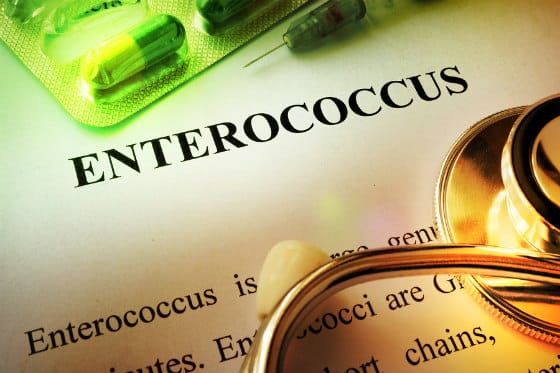You may have noticed that Enterococcus faecalis are being added to many probiotics on the market. As I see it, the safety of this organism is highly questionable and you should exercise caution when deciding whether to use one of these products.
Enterococcus has demonstrated the ability to inhibit hyphal morphogenesis and virulence in Candida albicans; therefore, it is often marketed as an anticandida product. However, it is a gram-positive, opportunistic bacterium that can also make you quite sick. According to researches at the University of Texas, “Enterococcus faecalis accounts for approximately 5%–8% of hospital-associated bacteremia and approximately 5%–20% of all cases of endocarditis.”
The New England Journal of Medicine tells us, “Although Enterococcus faecalis was once regarded as nonpathogenic, this opportunistic gram-positive coccus now ranks among the most troublesome hospital pathogens. It has intrinsic resistance to many antibiotics and a remarkable capacity for developing resistance to others.” The Canadian government lists enterococci as infectious agents and health hazards that are responsible for 10% of hospital-acquired infections in the United States.
Enterococci are consistently the second or third most common agent in urinary tract infections, wound infections, and bacteremia in hospitals. They are responsible for about 16 percent of nosocomial urinary tract infections. They can be transmitted on food products, person to person, and likely animal to human.
Enterococci are Lactic Acid Producers
Additionally, enterococci are lactic acid producers, so they may contribute to an excess of D-lactate and the associated problems. When present in excess, D-lactate is a neurotoxin and may contribute to a wide array of symptoms such as brain fog, attention deficit, headaches, confusion, slurred speech, anxiety, extremely painful muscle spasms and cramps, encephalopathy, impaired production of ATP, and more.
People with SIBO often have elevated levels of D-lactate, and supplementing with D-lactate producers will exacerbate the problem. Furthermore, people with SIBO are already dealing with an excess of bacteria in the small intestine, and their migrating motor complex is not working efficiently in order to move that bacteria out. Consuming more bacteria can lead to a worsening of SIBO itself.
People with Microbial Overgrowth are More Vulnerable
Although Enterococcus faecalis may reside in the colon of humans, it is a bad guy that is usually kept under control by our healthy guys. If dysbiosis is present, then this bad guy, like any of the others, can become pathogenic and cause disease.
When we are dealing with people who have damaged guts, impaired digestion, and peristalsis, and compromised immunity, as is the case in individuals with chronic Candida and SIBO, they may not have the same response to any probiotic that other individuals have, but especially one that contains an organism like Enterococcus faecalis. You can learn more about the pros and cons of various probiotics when you are dealing with Candida, SIBO, or other gut issues in my book Healing Chronic Candida, as well as everything else you need to know to address these issues most effectively.
I tried one of the popular products that contain Enterococcus faecalis, called Threelac, to test its efficacy against Candida. To prevent severe die off, I always start an antifungal with a smaller dose than what is recommended, so I took only one-quarter of the recommended dose. Within a few days, I developed a severe vaginal yeast infection. I also developed a high fever, sore throat, aches, pains, chills, hot breath, and chest congestion. I discontinued usage for a few days and then tried again to make sure I had not contracted an infection coincidentally with using the product. I went back to feeling normal. After a few days, I resumed taking a quarter of the recommended dosage; I once again developed a vaginal yeast infection, sore throat, high fever, etc. I again discontinued and then resumed usage. I developed the same symptoms, after which I discontinued usage.
My adult son tried the product. He also took only one-quarter of the recommended dosage and was flat in bed for three days after the first dose. He was much sicker than I had been, with a very high fever, severe migraine, chills, aches, pains, hot breath, etc. He wasn’t willing to try it again.
Many of my clients and more than seventy-five people on my blog have shared horrific stories about their experiences with products that contain Enterococcus faecalis as the primary ingredient. Some of their reported symptoms include stabbing pain in the perineum, shakes and shivers, inability to sleep, burning throat, burning eyes, anxiety, appendicitis, strep throat, severe brain fog, diarrhea, headaches, urinary tract infections, vaginal infections, profuse sweating, fatigue, aggressiveness, OCD behaviors, weakness, and inability to function, to name only a few. Many of these people reported that their symptoms lingered for weeks after they discontinued use. You can find similar stories on other forums across the Internet.
Weigh Risk Against Benefit and Exercise Caution
There are many different strains of Enterococcus faecalis, and a manufacturer of a probiotic that contains this organism may claim that the strain they use is safe. That may or may not be the case. If one particular strain has the ability to cause disease, then it is only logical to assume that other strains could develop those abilities as well, if they do not already possess them.
Please be aware that the large companies that make these products sometimes hire people to write convincing positive reviews and engage in other unscrupulous marketing tactics. Be sure you read labels and know what types of organisms are present in the probiotics you purchase. Weigh the risk against the potential benefit when deciding whether it is in your best interest to consume a particular organism. I think it is best to avoid Enterococcus faecalis, but if you decide to take the risk, you should monitor symptoms closely, watch for infection, and discontinue immediately if there is a negative response.

References
Melissa R. Cruz, et al. “Enterococcus Faecalis Inhibits Hyphal Morphogenesis and Virulence of Candida Albicans.” Infection and Immunity 81.1 (2013)
R. Sreedhar, et al. “Endocarditis and Biofilm-Associated Pili of Enterococcus Faecalis.” The Journal of Clinical Investigation 116.10 (2006) https://www.jci.org/articles/view/29021
David M. Phillips. “Enterococcus Faecalis.” The New England Journal of Medicine 1995. https://www.nejm.org/doi/full/10.1056/NEJM199501053320105
Public Health Agency of Canada. “Enterococcus Faecalis.” Pathogen Safety Data Sheet. https://www.phac-aspc.gc.ca/lab-bio/res/psds-ftss/enterococcus-eng.php
Araújo, Tatiane Ferreira, & Ferreira, Célia Lúcia de Luces Fortes. (2013). The genus Enterococcus as probiotic: safety concerns. Brazilian Archives of Biology and Technology, 56(3), 457-466. https://www.scielo.br/scielo.php?script=sci_arttext&pid=S1516-89132013000300014

